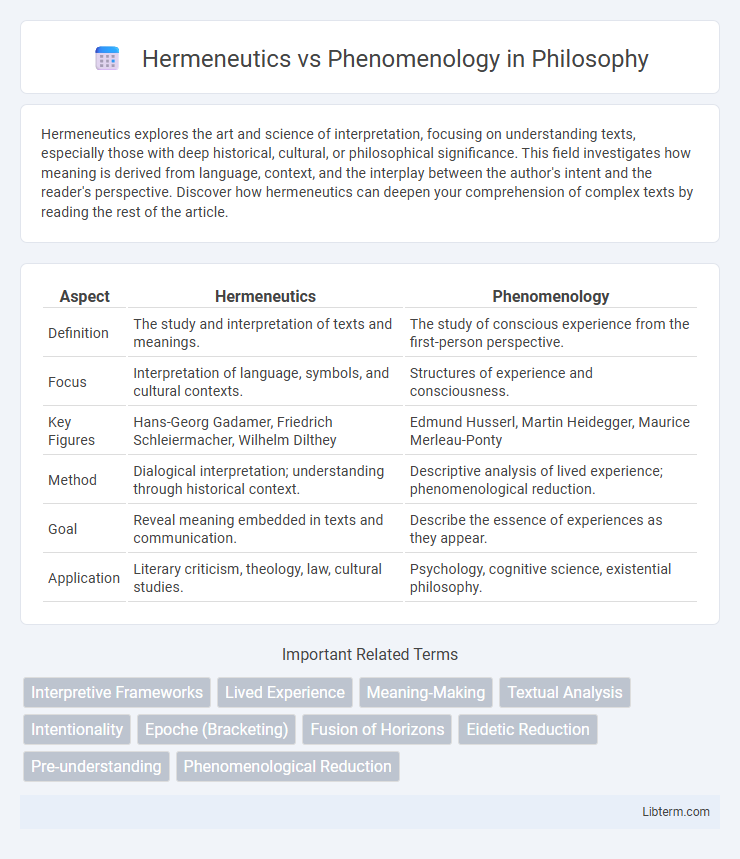Hermeneutics explores the art and science of interpretation, focusing on understanding texts, especially those with deep historical, cultural, or philosophical significance. This field investigates how meaning is derived from language, context, and the interplay between the author's intent and the reader's perspective. Discover how hermeneutics can deepen your comprehension of complex texts by reading the rest of the article.
Table of Comparison
| Aspect | Hermeneutics | Phenomenology |
|---|---|---|
| Definition | The study and interpretation of texts and meanings. | The study of conscious experience from the first-person perspective. |
| Focus | Interpretation of language, symbols, and cultural contexts. | Structures of experience and consciousness. |
| Key Figures | Hans-Georg Gadamer, Friedrich Schleiermacher, Wilhelm Dilthey | Edmund Husserl, Martin Heidegger, Maurice Merleau-Ponty |
| Method | Dialogical interpretation; understanding through historical context. | Descriptive analysis of lived experience; phenomenological reduction. |
| Goal | Reveal meaning embedded in texts and communication. | Describe the essence of experiences as they appear. |
| Application | Literary criticism, theology, law, cultural studies. | Psychology, cognitive science, existential philosophy. |
Introduction to Hermeneutics and Phenomenology
Hermeneutics is the study of interpretation, primarily of texts and symbolic expressions, emphasizing the understanding of meaning within historical and cultural contexts. Phenomenology, founded by Edmund Husserl, investigates the structures of conscious experience from a first-person perspective, focusing on how phenomena appear to consciousness. While hermeneutics seeks to clarify meaning through interpretative methods, phenomenology aims to describe experiences as they are lived, providing foundational insights into human perception and cognition.
Historical Roots of Hermeneutics
Hermeneutics traces its historical roots to ancient biblical exegesis and classical philology, evolving through the works of Friedrich Schleiermacher and Wilhelm Dilthey, who emphasized understanding the author's intent and historical context. Unlike phenomenology, which centers on the structures of lived experience established by Edmund Husserl, hermeneutics prioritizes interpretative frameworks shaped by cultural and historical conditions. This foundational distinction underscores hermeneutics' focus on decoding meaning within specific temporal and linguistic horizons, contributing to its methodological depth in the humanities.
The Evolution of Phenomenology
Phenomenology, pioneered by Edmund Husserl in the early 20th century, evolved as a method focused on the direct investigation and description of lived experience, emphasizing intentionality and consciousness. This approach diverged from hermeneutics, which centers on the interpretation of texts and meanings, pioneered by thinkers like Friedrich Schleiermacher and later Hans-Georg Gadamer. Phenomenology's evolution influenced existentialism and cognitive sciences, expanding its application beyond philosophical analysis to psychology and qualitative research methodologies.
Core Concepts in Hermeneutics
Hermeneutics centers on the interpretation of texts, emphasizing the relationship between the author's intent, the text itself, and the reader's understanding within historical and cultural contexts. Core concepts include the hermeneutic circle, which highlights the dynamic interaction between parts and the whole of a text during interpretation, and the fusion of horizons, describing how the interpreter's perspective merges with the author's viewpoint. Phenomenology, in contrast, focuses on the direct experience and consciousness of phenomena, prioritizing lived experience over textual analysis.
Fundamental Principles of Phenomenology
Phenomenology centers on the direct examination of lived experience, emphasizing intentionality, the notion that consciousness is always about something, and epoche, the suspension of judgment to reveal the essence of phenomena. It prioritizes first-person perspective and the reduction of preconceived biases to uncover pure experience. Hermeneutics, by contrast, focuses on interpretation and the meaning-making processes within historical and cultural contexts.
Key Thinkers in Both Traditions
Hermeneutics, prominently shaped by Hans-Georg Gadamer and Friedrich Schleiermacher, emphasizes interpretation and the contextual understanding of texts, while phenomenology, founded by Edmund Husserl and expanded by Martin Heidegger, centers on the structures of conscious experience and intentionality. Gadamer's philosophical hermeneutics stresses the historicity of understanding, contrasting with Husserl's focus on the rigorous reduction of phenomena to their essence. Heidegger bridges both traditions by integrating existential analysis into hermeneutic phenomenology, highlighting the interpretive nature of human existence.
Methodological Differences: Hermeneutics vs Phenomenology
Hermeneutics centers on interpreting texts and uncovering meaning through the historical and cultural context, employing a circular process known as the hermeneutic circle. Phenomenology focuses on describing lived experiences and phenomena as they appear to consciousness, emphasizing intentionality and bracketing presuppositions. Methodologically, hermeneutics strives for interpretive understanding, while phenomenology aims for descriptive clarity of subjective experience.
Applications in Social Sciences and Humanities
Hermeneutics, centered on interpretive understanding of texts and social actions, plays a crucial role in qualitative research, enabling scholars to analyze cultural meanings and historical contexts in social sciences and humanities. Phenomenology emphasizes the subjective experience and consciousness of individuals, often applied in psychology, sociology, and anthropology to explore lived experiences and social phenomena. Both methodologies contribute to deepening insights into human behavior, with hermeneutics decoding symbolic systems and phenomenology uncovering the essence of personal and collective experiences.
Critiques and Limitations of Each Approach
Hermeneutics faces critiques for its reliance on subjective interpretation, which can lead to varying meanings and potential bias, limiting its applicability in objective analysis. Phenomenology is often criticized for its abstract nature and difficulty in operationalizing lived experiences, which challenges empirical verification and practical application. Both approaches struggle with balancing depth of understanding and scientific rigor, affecting their utility across diverse research fields.
Future Directions in Interpretive Philosophy
Future directions in interpretive philosophy increasingly emphasize the integration of hermeneutics and phenomenology to deepen understanding of human experience and meaning-making processes. Emerging research explores how digital technology and AI influence interpretive frameworks, enhancing the contextual analysis of texts and lifeworld phenomena. Interdisciplinary approaches combining cognitive science, linguistics, and hermeneutic-phenomenological methods are poised to expand the horizons of meaning interpretation in complex social and cultural environments.
Hermeneutics Infographic

 libterm.com
libterm.com